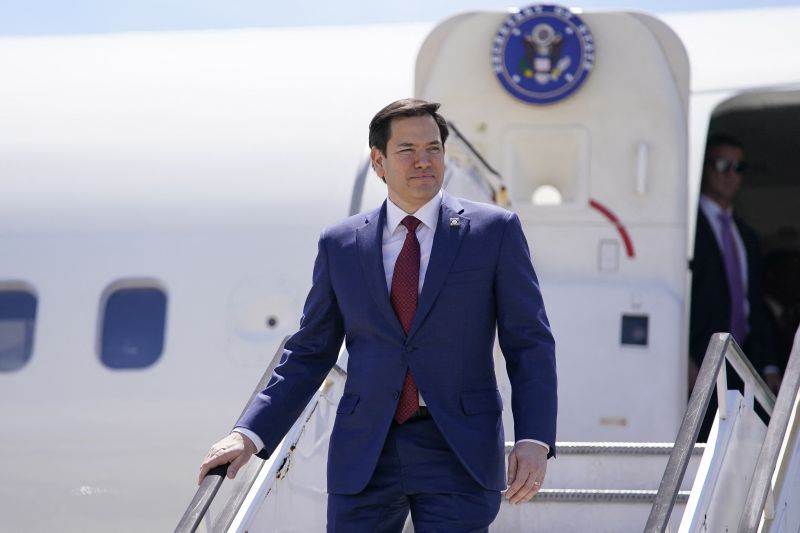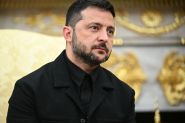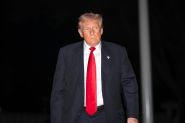- Home
- Middle East
- Marco Rubio Met with Sergei Lavrov on the Sidelines of the Escalation in Ukraine

U.S. Secretary of State Marco Rubio steps off a plane upon arrival at Norman Manley International Airport in Port Royal, Jamaica, on March 26, 2025. ©Nathan Howard / AFP
U.S. Secretary of State Marco Rubio met Thursday in Malaysia with his Russian counterpart Sergei Lavrov, with the war in Ukraine coming up on the sidelines of a diplomatic meeting of Southeast Asia dominated by Washington’s trade war.
Mr. Rubio’s visit, his first in Asia since taking office, coincides with Donald Trump’s intensification of his trade war. The latter threatened punitive tariffs this week against more than 20 countries.
The American top diplomat spoke with Sergei Lavrov on the sidelines of a meeting of foreign ministers of the Association of Southeast Asian Nations (ASEAN), a regional organization of 10 countries, in Kuala Lumpur.
Their meeting began just hours after Russia struck the Ukrainian capital Kyiv with a second deadly salvo of drones and missiles in two days.
This latest attack caused two deaths, according to local authorities.
It followed harsh comments from the American president towards his Russian counterpart Vladimir Putin, whom he accused of making “nonsense” about Ukraine.
Donald Trump also stated that the United States would send “more weapons” to Kyiv to defend itself, thus expressing Washington’s growing frustration on this issue.
Messrs. Rubio and Lavrov had already met in mid-February in Saudi Arabia, following the rapprochement between Presidents Trump and Putin. They have also spoken several times by phone.
He also declared that he is optimistic about the ceasefire in Gaza, as well as the upcoming indirect talks led by Steve Witkoff, the U.S. special envoy to the Middle East.
“Central Point”
After Malaysia, Sergei Lavrov is scheduled to travel this weekend to North Korea, where senior Russian officials have visited several times in recent months.
Pyongyang has indeed moved closer to Moscow, sending thousands of North Korean soldiers to the Russian Kursk region to drive out Ukrainian forces, and transporting ammunition and missiles to Russia.
In his first statements in Kuala Lumpur, the American top diplomat assured that the United States has “no intention whatsoever of abandoning” the Asia-Pacific.
“The region remains a central point of U.S. foreign policy,” Mr. Rubio affirmed.
“We have no intention whatsoever of abandoning our partnerships, but rather to strengthen and develop them,” he added, while U.S. attention has largely focused on conflicts in Ukraine and the Middle East.
However, Donald Trump also threatened about twenty countries, many of them Asian, with higher tariffs than initially planned, ranging from 20% to 50%.
He also announced a 50% tax on copper imports and another of 200% that could be applied to pharmaceutical products.
Malaysian Prime Minister Anwar Ibrahim denounced on Wednesday, at the opening of the ASEAN meeting, tariffs that have become “sharp tools serving geopolitical rivalries.”
Asia Targeted
Donald Trump announced on Monday that tariffs suspended in April would be reinstated starting August 1 — sometimes with even higher increases — if no agreement with Washington is reached.
Among the targeted countries are some of Washington’s main allies, such as Japan and South Korea, with surtaxes of 25%.
ASEAN members Indonesia, Laos, Thailand, Malaysia, the Philippines, Brunei, and Myanmar risk tariffs ranging from 20% to 40%.
Vietnam is the only country, along with the United Kingdom, to have reached a framework agreement with the United States, allowing it to be hit significantly less hard than initially planned.
In Malaysia, Marco Rubio is also expected to hold trilateral talks with the Philippines and Japan, against the backdrop of tensions in the South China Sea.
His Chinese counterpart Wang Yi is also attending this ASEAN meeting. However, no meeting between the two men has yet been confirmed.
Disputes between Beijing and Washington remain numerous, ranging from trade to fentanyl, Taiwan, and rivalry in advanced technologies.
“The South China Sea is a common home for countries in the region, not an arena for gladiators among great powers,” Wang Yi said during a meeting Thursday between China and ASEAN, in a veiled reference to the United States.
By Leon Bruneau and Ludovic Ehret, AFP
Read more



Comments